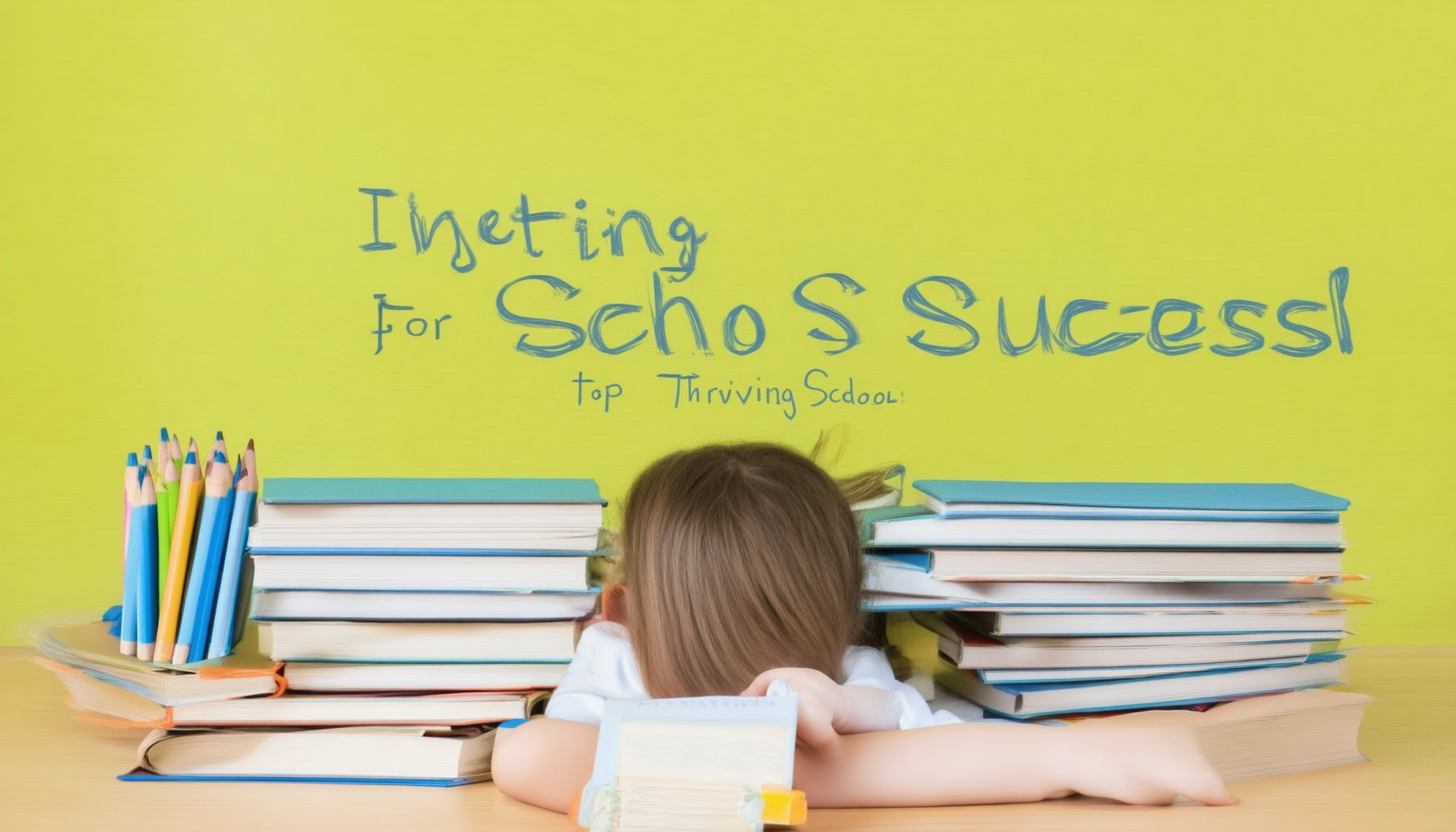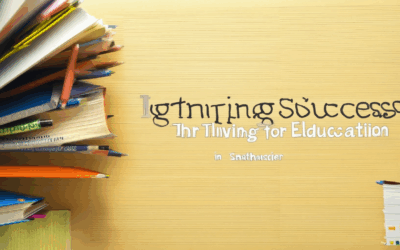School success is a cornerstone of future achievements, shaping lives and opportunities. Achieving it requires a blend of dedication, strategy, and knowledge. This guide delves into proven strategies that empower students to thrive academically and personally. From cultivating strong study habits to mastering time management, building positive relationships, and staying motivated, we explore actionable steps to unlock your potential. Understanding learning styles, leveraging resources effectively, and fostering collaborative learning environments are key elements that contribute to long-term academic success. Additionally, we examine the importance of regular review, seeking feedback, and maintaining a supportive environment—all critical components for excelling in school. By addressing these areas, this comprehensive approach offers a roadmap to overcoming challenges and embracing growth, ensuring every student can achieve their full potential.
Key Takeaways
– Develop Strong Academic Foundations: Access tailored learning strategies, regular feedback, and extracurricular opportunities to build a solid academic base.
– Master Organizational Skills: Use productivity tools, study habits, and goal-setting to manage time effectively and stay on track.
– Prioritize Social-Emotional Well-being: Engage in stress management programs, seek mental health support, and participate in community-building activities.
– Leverage Resource Access: Utilize academic materials, online tools, and community programs to enhance learning and personal growth.
– Seek Personalized Guidance: Benefit from one-on-one counseling, customized plans, and mentorship programs aligned with individual strengths and goals.
– Set Clear Goals and Stay Motivated: Employ goal-setting tools, incentive programs, and peer networks to maintain focus and drive success.
– Adopt Proven Study Habits: Dedicate study time, break tasks into manageable sections, and choose distraction-free locations for optimal focus.
– Master Time Management: Use planners, prioritize tasks, and allocate time for breaks to maintain efficiency and balance.
– Foster Individual Engagement: Tailor learning environments and extracurricular activities to cater to each student’s unique strengths and interests.
– Build Robust Support Systems: Implement academic advising, mentorship programs, and access to resources like tutoring and online platforms.
– Promote Social-Emotional Learning (SEL): Incorporate mindfulness, conflict resolution, and team-building exercises to nurture essential life skills.
– Encourage Teacher-Parent Collaboration: Strengthen communication and shared responsibility to align efforts and provide consistent support.
– Celebrate Diversity and Inclusivity: Create an inclusive environment that values all students, offers culturally responsive curricula, and fosters a sense of belonging.
– Integrate Technology Thoughtfully: Use LMS, online assessments, and digital resources to enhance accessibility and personalize learning experiences.
– Ensure Cultural Responsiveness: Adapt policies and practices to accommodate diverse backgrounds, offering bilingual education and multicultural perspectives.
By implementing these strategies, schools can create a holistic support system that empowers students to thrive academically and personally. For more resources and proven methods, visit Enroll Maven.
Top Strategies for School Success Guidance
Success in school requires a combination of effective strategies, discipline, and a positive mindset. Here are some proven approaches to help you excel:
- Stay Organized:** Use tools like digital calendars, planners, or task management apps to track assignments, exams, and deadlines. Create a study schedule that aligns with your peak productivity times.
- Master Time Management:** Prioritize tasks based on urgency and importance. Break large projects into smaller, manageable steps. Use techniques like the Eisenhower Matrix to categorize tasks.
- Develop Strong Study Habits:** Engage in active reading, summarize key points, and take notes. Practice spaced repetition for memorization. Choose a quiet, distraction-free environment for studying.
- Set SMART Goals:** Define Specific, Measurable, Achievable, Relevant, and Time-bound objectives. Break long-term goals into shorter, actionable steps.
- Cultivate a Growth Mindset:** Embrace challenges and view failures as opportunities to learn and grow. Surround yourself with supportive peers who encourage your progress.
- Seek Help When Needed:** Don’t hesitate to ask teachers, mentors, or classmates for clarification or support. Join study groups or seek tutoring assistance when needed.
- Take Care of Yourself:** Maintain a balanced diet, regular exercise, and adequate sleep. Manage stress through activities like meditation, hobbies, or physical fitness.
- Stay Curious and Motivated:** Keep asking questions and explore new topics that interest you. Set personal milestones to keep yourself inspired and focused.
- Leverage Technology:** Utilize educational apps, online resources, and video tutorials to enhance your learning process. Stay updated with the latest tools and innovations in education.
By implementing these strategies, you can create a strong foundation for academic success and long-term achievement. Remember, consistency and perseverance are key to excelling in school and beyond.
How Students Can Achieve School Success
To help students achieve school success, it’s essential to adopt a proactive and strategic approach. Below are proven strategies that can lead to academic excellence:
- Master Time Management : Prioritize tasks based on deadlines and difficulty. Use tools like planners or digital calendars to stay organized and avoid last-minute stress.
- Set Clear Goals : Define short-term and long-term objectives. Break larger goals into manageable steps to track progress effectively.
- Engage in Active Learning : Participate actively in class discussions, ask questions, and seek clarification to fully understand concepts.
- Seek Help When Needed : Don’t hesitate to reach out to teachers, mentors, or study groups for support when facing challenges.
- Balance School and Personal Life : Allocate time for hobbies, relaxation, and social activities to maintain mental well-being.
- Practice Self-Care : Ensure adequate sleep, nutrition, and exercise to sustain energy levels and cognitive function.
- Leverage Technology : Utilize educational apps, online resources, and tools to enhance learning and organization.
- Collaborate with Peers : Join study groups or study clubs to benefit from collective knowledge and shared problem-solving.
- Stay Motivated : Maintain a positive attitude and celebrate achievements to stay driven and focused.
By implementing these strategies, students can create a strong foundation for academic success and personal growth. For more detailed guidance, explore Enroll Maven’s comprehensive school success guides at Enroll Maven .
Key Elements of Effective School Success Guidance
The foundation of effective school success guidance lies in several critical components that work synergistically to foster academic achievement and personal growth. Here’s a breakdown of the essential elements:
- Personalized Support
- Tailored assistance ensures that each student receives attention suited to their individual strengths, challenges, and goals. Schools and mentors adapt strategies to meet diverse needs, creating a supportive environment where every student feels valued.
-
Clear Academic Goals
- Setting achievable, short-term and long-term objectives helps students stay focused and motivated. These goals align with broader academic aspirations, providing a roadmap for success and reinforcing self-belief.
-
Active Participation
- Engaging students and families in the process is vital. Regular communication, parent-teacher collaborations, and student-led initiatives ensure everyone is invested in the student’s progress and well-being.
-
Strong Teacher-Student Connections
- Building trusting relationships between teachers and students encourages open dialogue and emotional support. This connection fosters resilience and enables students to seek help when needed.
-
A Positive Mindset
- Cultivating a growth mindset helps students view challenges as opportunities for learning and personal development. Emphasizing effort over perfection promotes a healthier approach to academic endeavors.
-
Effective Study Habits
- Teaching students practical study techniques, time management, and organization skills equips them to handle coursework more efficiently. These habits lay the groundwork for long-term academic success.
-
Access to Resources
- Providing access to necessary tools, whether digital resources, tutoring services, or extracurricular activities, ensures students have every opportunity to thrive academically and socially.
For more insights and actionable strategies, explore Enroll Maven’s comprehensive guide on optimizing school success: Enroll Maven . Additionally, discover similar approaches at StudyWell and AcademicSuccessHub .
What Are the Essential Components of Effective School Success Guidance?
To achieve long-term academic and personal growth, effective school success guidance must address several critical areas. Here’s a breakdown of the essential components:
- Academic Support
- Access to tailored learning strategies and resources.
- Regular feedback from teachers and mentors.
- Opportunities for skill-building through extracurricular activities.
- Connection to community programs and partnerships.
- Organizational Skills
- Development of time management and task prioritization techniques.
- Introduction to productivity tools and digital apps.
- Workshops on study habits and goal-setting.
- Access to planners or organizers for daily planning.
- Social-Emotional Well-Being
- Programs focused on stress management and resilience building.
- Resources for mental health support and counseling services.
- Community-building activities to foster collaboration and empathy.
- Training in conflict resolution and communication skills.
- Resource Access
- Availability of academic materials, textbooks, and online databases.
- Links to free or discounted software and tools for learning.
- Information on scholarships, grants, and financial aid opportunities.
- Referrals to local libraries and educational centers.
- Personalized Guidance
- One-on-one counseling sessions to align career goals with academic interests.
- Customized plans based on individual strengths, weaknesses, and needs.
- Access to mentorship programs with successful alumni or professionals.
- Feedback loops to monitor progress and adjust strategies.
- Goal Setting and Motivation
- Tools for setting short-term and long-term academic and personal goals.
- Incentive programs and recognition for achievements.
- Workshops on maintaining motivation and staying focused.
- Access to peer networks and study groups for accountability.
By integrating these components, schools and guidance counselors can create a holistic support system that empowers students to thrive academically and personally. For more resources and strategies, visit Enroll Maven to explore our comprehensive guide on academic success.
Best Methods for Achieving School Success Guidance
Success in school requires a combination of effective strategies, consistent effort, and smart planning. Here are the top methods to guide you toward academic excellence:
- Develop Strong Study Habits
- Set aside dedicated study time each day.
- Choose a quiet, distraction-free location for studying.
- Break study material into smaller, manageable sections.
- Master Time Management
- Use planners or digital tools to organize tasks.
- Prioritize tasks based on deadlines and importance.
- Allocate time for breaks to maintain focus.
- Improve Organization Skills
- Keep a organized notebook or digital notes app.
- Use color-coded folders or digital files for subjects.
- Regularly review and update your schedule.
- Seek Support and Resources
- Ask teachers or mentors for guidance and advice.
- Join study groups or study clubs for collaborative learning.
- Utilize online resources and tools for additional support.
- Maintain a Positive Attitude
- Stay motivated and set realistic goals.
- Practice gratitude and celebrate achievements.
- Embrace challenges as opportunities for growth.
By implementing these strategies, you can create a structured and productive environment that supports your academic success. For more tips and resources, visit Enroll Maven to discover proven methods for excelling in school.
Factors Contributing to Effective School Success Guidance
Effective school success guidance is achieved through a combination of several key factors that work synergistically to create a supportive and enriching environment for students. These factors include:
- Engaging Students Individually: Schools that recognize and cater to each student’s unique strengths and interests often see higher levels of engagement. Personalized learning plans, flexible learning environments, and opportunities for extracurricular activities tailored to individual interests can significantly boost student motivation and academic performance.
- Implementing Robust Support Systems: Comprehensive support structures such as academic advising, mentorship programs, and access to necessary resources (e.g., tutoring services, study groups, and online learning platforms) provide students with the tools they need to succeed. These systems help bridge gaps in knowledge and skills, ensuring students are well-prepared for challenges.
- Fostering Social-Emotional Learning (SEL): Schools that prioritize SEL initiatives help students develop essential life skills such as emotional regulation, empathy, and problem-solving. Programs like mindfulness workshops, conflict resolution training, and team-building exercises create a positive climate that supports academic achievement and personal growth.
- Encouraging Teacher-Parent Collaboration: Strong partnerships between educators and families are crucial for student success. Regular communication, shared responsibility, and collaborative goal-setting allow teachers and parents to align their efforts, providing consistent support and guidance for students.
- Promoting Inclusivity and Diversity: Creating an inclusive environment where every student feels valued and respected is vital. Schools that celebrate diversity, offer culturally responsive curricula, and provide opportunities for dialogue and understanding foster a sense of belonging among all students.
- Leveraging Technology Wisely: Integrating technology into teaching and learning processes enhances accessibility and personalization. Tools like learning management systems (LMS), online assessments, and digital resources enable students to track their progress, receive immediate feedback, and access additional support whenever needed.
- Ensuring Cultural Responsiveness: Schools must adapt their policies and practices to accommodate the cultural backgrounds of their students. This includes offering bilingual education, hiring teachers from diverse backgrounds, and incorporating multicultural perspectives into the curriculum to ensure all students feel represented and supported.
By integrating these factors into their guidance programs, schools can create a holistic environment that addresses the multifaceted needs of students, paving the way for their long-term success. This comprehensive approach not only improves academic outcomes but also nurtures well-rounded individuals prepared for the challenges of the future.









0 Comments